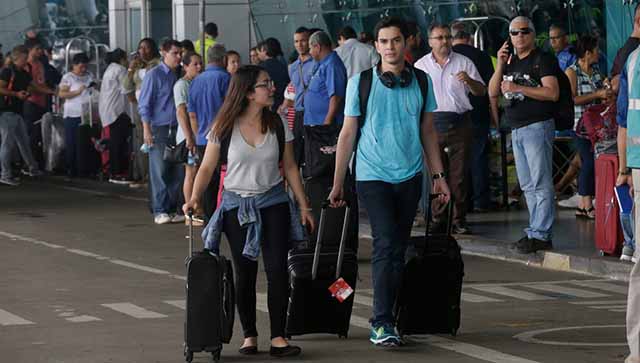The advent of Artificial Intelligence (AI) has led to transformative shifts across multiple industries, making what once seemed like sci-fi concepts a part of our everyday lives. The power of AI technologies, like OpenAI’s ChatGPT, is starting to shape the future, yet we’re only scratching the surface of its potential, especially within the dynamic landscape of the travel industry. Despite the travel industry being one of the most rapid-growing sectors, it has only recently begun to explore the comprehensive spectrum of AI’s possibilities. Travel planning is often a tedious process involving significant time dedicated to coordinating flights, accommodations, and experiences. However, a sophisticated AI-driven chat system, akin to ChatGPT, but specifically honed for the travel sector, holds the promise to transform this laborious task into a seamless and enjoyable experience. AI’s revolutionary potential in the travel industry Natural Language Processing (NLP): The Future of Customised Travel NLP enables systems to comprehend, interpret and respond to user requests, laying the groundwork for customised travel solutions. Consider this scenario: if a user informs the AI of an upcoming meeting in Bandra at 2 PM on Monday, the system can intelligently process this information and recommend the optimal flight landing in Mumbai before noon, ensuring ample time for rest and preparation. Contextual dialogue engines: Maintaining a rich conversation for comprehensive travel planning Planning an end-to-end trip isn’t a simple one-question, one-answer scenario—it’s a comprehensive conversation that involves numerous details. Contextual Dialogue Engine models, such as those used in Rivi and ChatGPT, have the capability to remember the context of prior messages, allowing them to maintain the richness of a long conversation and provide a more human-like interaction. Unlike systems like Alexa or Siri, which primarily understand and respond to individual messages, these engines can construct a cohesive dialogue, comprehensively addressing a user’s travel needs. Personalised recommendations: Crafting a unique travel experience Just as Netflix, Spotify and YouTube use AI to fine-tune their content recommendations based on users’ preferences, travel companies can build AI-based recommendation systems to craft unique travel experiences. Through engaging interactions, AI can ascertain a user’s travel preferences and progressively fine-tune trip recommendations. Consider a budget-conscious traveler who’s passionate about sustainability, enjoys hiking, loves nature, and prefers Indian vegetarian cuisine. As they plan a two-week vacation, the AI crafts a customized Bali itinerary. It selects the most affordable flight with low carbon emissions, suggests eco-friendly accommodations, and recommends local vegetarian dining options. From guided rainforest hikes to participation in local conservation projects, every detail can be meticulously curated by AI to align with the user’s values and interests. Generative AI for content and query resolution: Enhancing user engagement AI technologies can generate captivating content and resolve complex travel queries. A prime example is the creation of personalized travel guides tailored to a user’s unique circumstances. For instance, consider a user planning to travel internationally. Based on their country of citizenship, destination, duration of stay, and purpose of visit, the AI system could generate an in-depth guide, outlining the specific visa requirements and application process for that user. Optimised route planning: Maximising efficiency in multicity trips Imagine planning a 15-day trip across five European cities from Delhi. Now, add in the complexity of attending scheduled events in certain cities on specific dates as well as the desired number of days a user wants to spend in each city. The number of permutations of possible routes for such a trip would be astonishingly high, presenting a complex puzzle for any traveller. AI like Rivi steps in to eliminate this complexity. By intelligently analyzing all possible combinations of flights, trains, and other inter-city transfers, AI can recommend the most cost-effective and efficient itinerary. The outcome? A personalised travel route that is not just cost-effective and efficient, but also thoughtfully tailored to the user’s preferences and interests. Continuous learning: Fostering AI growth through human interaction On occasions where the AI falls short in solving a user’s query, the user can be redirected to a human agent. This critical interaction doesn’t just address the user’s immediate issue, but serves as a valuable learning input for the AI system, enhancing its capacity to handle similar inquiries in the future. Navigating challenges and ethical considerations It’s imperative to acknowledge the challenges and ethical considerations of implementing AI in the travel industry. Concerns such as data privacy, bias in AI recommendations, and the impact on employment are aspects that need careful consideration and transparent addressing, ensuring an ethical and balanced approach towards AI integration. Conclusion: A journey towards an AI-driven travel experience The future of the travel industry lies in the intelligent integration of AI. By leveraging personalized recommendations, natural language understanding, generative AI, and continuous learning, we can reimagine travel as not just a seamless process, but a deeply personal and uniquely satisfying experience. Embracing AI is not just about streamlining operations or enhancing profitability; it’s about centering the travel experience around each traveler, creating memorable journeys that inspire and delight. The author is founder at Rivi - AI in travel company. Views expressed are personal. Read all the Latest News , Trending News , Cricket News , Bollywood News , India News and Entertainment News here. Follow us on Facebook, Twitter and Instagram.
The future of the travel industry lies in the intelligent integration of AI
Advertisement
End of Article


)

)
)
)
)
)
)
)
)



